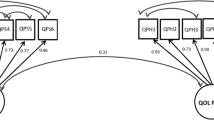Summary.
Objectives:
To assess differences between overweight and normal- weight adults in sense of coherence (SOC), health locus of control (HLOC), and health-related quality of life (HQOL).
Methods:
Cross-sectional population study (Augsburg, Germany). Random sample aged 25‒4 (N = 947). Body mass index (BMI) was categorized into four groups (normal-weight: 18.5–25; pre-obesity: 25–29.9; moderate obesity: 30–34.9; severe obesity: ≥35). The associations between obesity classification and SOC-13T, MHLOC-Scales, and SF-12 summary scores were estimated via analysis of covariance.
Results:
Adjusted for age and socio-economic status, no differences across BMI-groups related to SOC, internal HLOC, external HLOC-’chance- and SF-12-’mental health’ HLOC-’doctors’ was marginally elevated in obese women. Larger differences pertained to SF-12-‘physical health’ in that it was considerably reduced in obese women and severely obese men.
Conclusions:
In this adult population sample, obesity is not associated with SOC, HLOC, and HQOL in terms of mental health, but is associated with poorer physical health, which was reported by all groups of obese women, and by severely obese men. These results underline the need to treat and prevent obesity to restore and promote physical HQOL, and to distinguish moderate vs. severe obesity in obesity research.
Zusammenfassung.
Kohärenzgefühl, gesundheitsbezogene Kontrollüberzeugungen und gesundheitsbezogene Lebensqualität bei adipösen Erwachsenen: physische Einschränkungen und psychische Normalitäten Ziel: Bestimmung von Unterschieden im Kohärenzgefühl (SOC), in gesundheitsbezogenen Kontrollüberzeugungen (HLOC) und in der gesundheitszogenenen Lebensqualität (HQOL) zwischen uber- und normalgewichtigen Erwachsenen.
Methoden:
Querschnittsurvey einer Zufallsstichprobe der Bevölkerung im Alter von 25–34 in der Region Augsburg (N = 947). Der Body Mass-Index (BMI) wurde in vier Gruppen kategorisiert (Normalgewicht: 18.5.25; Präadipositas: 25.29.9; moderate Adipositas: 30–34.9; starke Adipositas: ≥?35). Die Zusammenhänge zwischen Adipositas-Klassifikation und dem SOC-13T, den MHLOC-Skalen und den SF-12-Summenskalen wurden durch Kovarianzanalysen analysiert.
Ergebnisse:
Adjustiert für Alter und sozioökonomischen Status wurden keine Unterschiede zwischen den BMI-Gruppen im SOC, internalem und fatalistischem HLOC, und in der psychischen Lebensqualität (SF-12) festgestellt. HLOC-’Ärzte’ war bei adipösen Frauen geringfügig erhöht. Größere Unterschiede betrafen die physische Lebensqualitat (SF-12): die subjektive körperliche Gesundheit war bei adipösen Frauen und stark adipösen Männern im Mittel wesentlich reduziert.
Schlussfolgerungen:
In dieser Bevölkerungsstichprobe Erwachsener war Adipositas weder mit SOC und HLOC noch mit psychischer Lebensqualität, jedoch mit eingeschränkter körperlicher Lebensqualität assoziiert, und zwar in beiden Gruppen adipöser Frauen sowie bei stark adipösen Männer. Diese Ergebnisse unterstreichen den Bedarf an Behandlung und Prävention der Adipositas zur Wiederherstellung und Förderung körperlicher Gesundheit, und die Bedeutung der Unterscheidung von moderater vs. starker Adipositas in der Adipositasforschung.
Résumé.
Sentiment de cohérence, « health locus of control », et qualité de vie d’adultes obèses : limitations physiques et normes psychologiques
Objectifs:
Evaluer différences présentées par des adultes de poids normal et en surpoids en matière de sentiment de cohérence (SOC), de « health locus of control » (HLOC) et de qualité de vie en lien avec la santé.
Methodes:
Etude populationnelle transversale (Augsbourg, Allemagne). Echantillon aléatoire (25–34 ans, N = 947). Les indices de masse corporelle (IMC) ont été répartis en quatre catégories: poids normal (18.5–25), pre obèse (25–29.9), obésité modérée (30–34.9), obésité sévère (≥35). Les associations entre cette classification de l’obésité et différentes échelles (SOC- 13T, MHLOC-Scales, SF-12 summary scores) ont été estimées au moyen d’analyses de covariances.
Résultats.
Après avoir ajusté pour l’âge et le statut socio-économique, aucune différence n’a été trouvée entre les groupes d’IMC en ce qui concerne le SOC, le HLOC interne, le HLOC-’hasard-externe, ainsi que le SF-12-’santé mentale’ Le HLOC-’medecinsétait marginalement élevé chez les femmes obéses. De plus grandes différences ont été constatées dans le SF-12-’santé physique-qui était considérablement réduit chez les femmes obèses et chez les hommes severement obèses.
Conclusions:
Dans cet échantillon populationnel d’adultes, l’obésité n’est associée ni avec le SOC, ni avec le HLOC, ni avec le HQOL en termes de santé mentale. L’obésité est par contre associée avec une mauvaise santé physique, chez tous les groupes de femmes obèses et par les hommes très obèses. Ces résultats mettent en évidence de besoin de traiter et de prévenir l’obésité de manière à rétablir et à promouvoir la qualité de vie en lien avec la santé. Il importe également de distinguer entre l’obésité modérée et l’obésité sévère dans la recherche consacrée à l’obésité.
Similar content being viewed by others

Abbreviations
- ANCOVA:
-
analysis of covariance
- BMI:
-
body mass index
- HLOC:
-
health locus of control
- HQOL:
-
health-related quality of life
- SOC:
-
sense of coherence
Author information
Authors and Affiliations
Consortia
Corresponding author
Additional information
The KORA Study Group consists of H.-E. Wichmann (speaker), H. Lowel, C. Meisinger, T. Illig, R. Holle, J. John, and co-workers who are responsible for the design and conduct of the KORA studies
Submitted: 4 April 2005; Revised: 22 November 2005, 6 April, 30 May 2006; Accepted: 6 June 2006
Rights and permissions
About this article
Cite this article
von Lengerke, T., Janssen, C., John, J. et al. Sense of coherence, health locus of control, and quality of life in obese adults: physical limitations and psychological normalcies. Int J Public Health 52, 16 (2007). https://doi.org/10.1007/s00038-006-5038-1
DOI: https://doi.org/10.1007/s00038-006-5038-1



